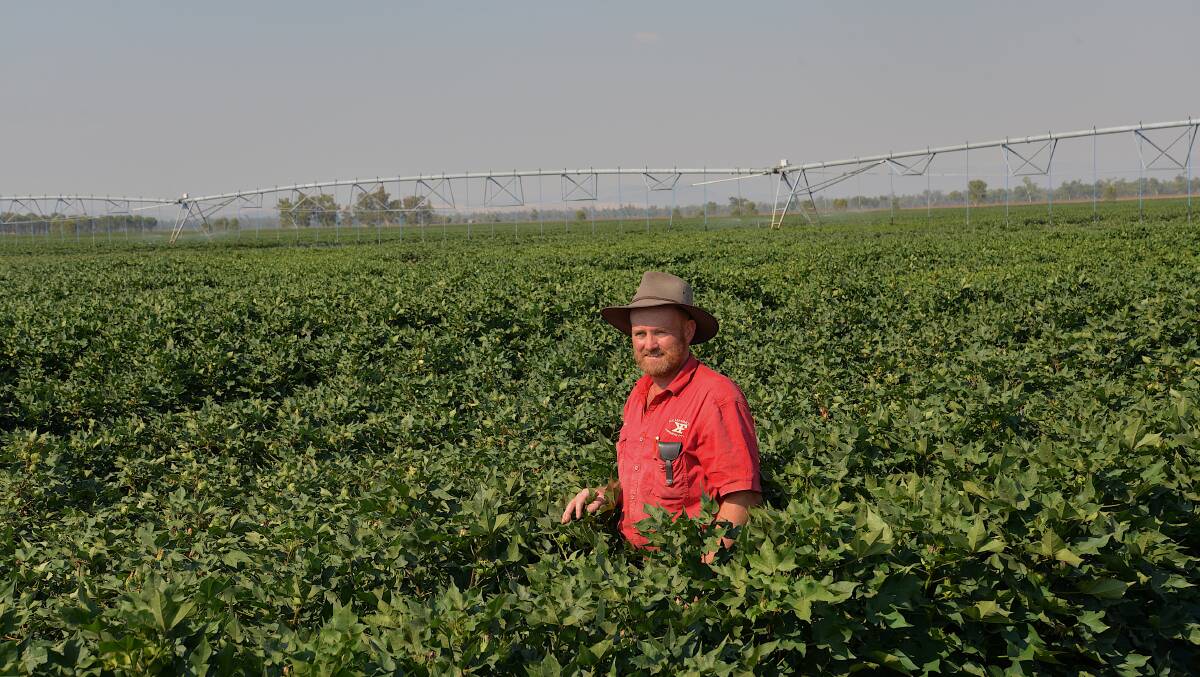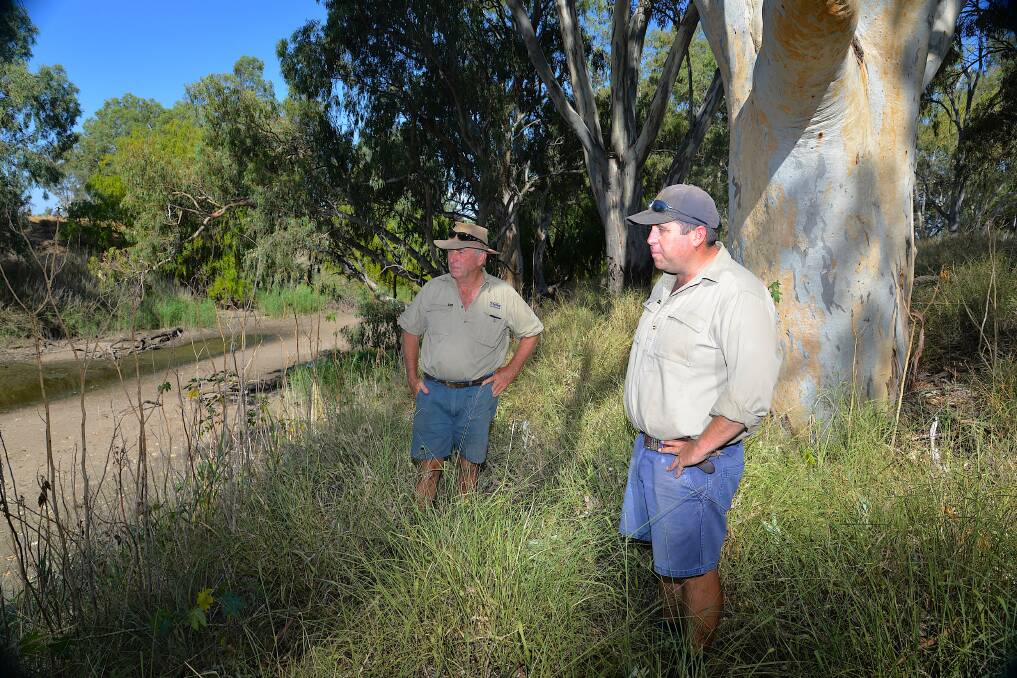
Could it be the Dunning-Kruger effect that is changing attitudes, or at least reducing opposition, towards cotton production in the Murray-Darling Basin?
Subscribe now for unlimited access to all our agricultural news
across the nation
or signup to continue reading
Northern NSW Namoi Valley irrigator Matt Norrie thinks so.
The Dunning-Kruger effect is a syndrome identified in 1999 by psychologists David Dunning and Justin Kruger that causes incompetent people to believe they're smarter than they are.
It plays out, in part, when people who are ignorant about a subject think they know everything. But as they become more knowledgeable, they begin to realise how little they know.
Which is where the debate about cotton and water use in the MDB comes in.
Criticism of the cotton industry and irrigation reached fever pitch earlier this year, peaking after the mass fish kill on the lower Darling River in western NSW in January and continuing for the next six months.
Everyone, it seemed, became an instant expert on water use in the basin, with cotton growers labelled as the collective culprits.
A spate of knee-jerk reactions included calls by South Australian senators Rex Patrick, Rebekha Sharkie and Sarah Hanson-Young to ban cotton growing or cotton exports, or both.
The hype culminated in July with a contentious Four Corners program on ABC TV that alleged government-funded water infrastructure projects are effectively handing big companies millions of dollars to build on-farm water storages.
Related reading:
Matt Norrie believes these events created a Dunning-Kruger effect.
Armed with limited, incomplete or biased information, people formed instant opinions: cotton production is evil, cotton growers are crooks, water theft in the northern basin is rife; so ban them all.
"With social media, 'information' now goes around unchecked at a speed like never before," he says.
"It has been a contributing factor to negative attitudes (about cotton production)."
But now he, other irrigators and industry leaders believe that as more people have grasped the severity of the drought and realise the lack of water in northern basin dams and rivers hasn't been caused by irrigation - because, except for some groundwater use, there has been none.
Indeed, the 2019-20 cotton crop will reach barely a third of last season's diminished harvest and just 15 percent of the record five million-bale output in 2011-12.
Not only has the Dunning-Kruger effect kicked in, with public opposition to cotton waning, a new villain has emerged: large-scale almond plantations in the Murray and Murrumbidgee valleys, mostly by large corporate entities including offshore companies that also have bought considerable water rights.
While this has Dunning-Kruger symptoms too, almonds require twice the amount of water per hectare than cotton (approx. 12-13 megalitres vs 6.5).
So the heat is coming off cotton and moving to almonds.
Nonetheless, criticism of cotton has taken a hefty toll. And it may not be over, with imminent expansion of the industry into northern Australia and South Australia, where a ban on GM crops could soon be lifted.
At its peak, "some growers felt like the devil incarnate", Matt Norrie says. "You can't dismiss the impact this has had on mental health. For my part, I've stopped listening to the ABC Country Hour. I don't want to hear more criticism."
Fellow Namoi Valley grower, Andrew Watson, a former chairman of Cotton Australia and frequent social media user, says he became less likely to post cotton photos on Twitter after opposition escalated, concentrating instead on his environmental practices.
He says many farmers have abandoned social media because of adverse targeting by opponents.
"People criticising cotton on social media are in an echo chamber," he says.
"There have been some really aggressive comments. The haters are still hating. They're never going to listen.
"I'm very happy to defend cotton growing, but more so to defend irrigation. Cotton is simply a function of water regulation and licensing."
The general manager of Cotton Australia, Adam Kay, says there are many upset and disappointed cotton growers from adverse targeting of individuals and the industry.
"It has impacted on the mental health of some farmers and there are instances where some have had to leave social media. There have been a lot of baseless attacks. A small group of opponents have had a massive impact," he asserts.
"People pick up throwaway lines and don't listen to facts, including that 70 percent of water use (in the Murray-Darling Basin) in the past 10 years has gone to the environment."
But Adam Kay says market research shows attitudes are changing and the public is beginning to accept that cotton growers aren't to blame.
While public outrage has diminished, institutional critics haven't disappeared, even if they are less vociferous.
Senator Rex Patrick has dropped his bill to ban cotton exports and won't reintroduce it into federal parliament. More than 150 submissions to his draft legislation, almost all highly critical of its content and intent, may have quelled his views.
Related reading:
Senator Patrick now says he put forward the bill to ban cotton exports only "to start a conversation".
"My preference would be to take a pro-active stance to effect change," he says.
"Current laws are broken. We can't let the market decide (which crops can be grown and where) because it's possible all water could go to almonds and cotton. We have to approach water policy and use from the national interest and have a balance of diversity."
This, he argues, would adjust water licences to enable certain practices with caps on crops that can be grown in the basin.

Matt Norrie strongly opposes the idea, claiming it would drive inefficiency and put irrigators in an unfair competitive situation against dryland farmers.
But Senator Patrick isn't relenting and says cotton growers should pay greater attention to social licence.
Greens Senator Sarah Hanson-Young, who has previously called for cotton production to be banned in Australia, has gone to ground. Seventeen attempts to secure her updated views for this article, which have included calls for a Royal Commission, failed to produce a response.
Lower Darling grazier, Kate McBride, whose profile exploded following publicity about the big fish kill near her family's Tolarno Station in January, is an advocate for a Royal Commission.
She believes a growing number of people are "switching on to the issue".
She says she isn't only blaming cotton growers, but claims "big corporate businesses have got away with too much".
"I'm pointing the finger at government, which has allowed too many licences.
"The embargo (against pumping water in northern NSW) has been good, but it isn't enough."
She also opposes underground water being used to irrigate cotton.
"It takes millions of years to build up aquifers. We should put food security first," she says.

What do the academics say?
Director of the Centre for Ecosystem Science at the University of NSW, Professor Richard Kingsford, says he believes the cotton industry has tried to do the right thing and shouldn't be "taken out."
But he argues the consequences of water extractions, when allowed, have been far reaching.
"There are going to be chronically less flows down the Darling in the future," he said.
"Rivers need to get over their banks. Even in the south (where rivers seem in reasonable shape), the flood plains aren't coping well. The problem is people don't see rivers as flood plains."
Prof. Kingsford says the government hasn't identified the scale of irrigation development since the MDB cap was set from the mid-1990s.
"We should look at infrastructure that existed then and revert back to that level," he maintains. "It's a difficult issue, but the way infrastructure was constructed affects flows."
Australian National University professor, Quentin Grafton, a long-standing critic of the Murray-Darling Basin Plan, says he isn't anti-cotton, but contends that anyone extracting water should be required to submit a water access plan to state what they plan to take and for what purpose.
He argues that water use needs to be assessed in non-market terms and doesn't believe it is unreasonable for irrigation licences to include special conditions.
"Circumstances change, so rules need to be adapted," he attests.
"Better public interest outcomes are needed. Water has been allowed to be extracted at very low (river) levels. If we don't have changes, there won't be good outcomes."
Start the day with all the big news in agriculture! Click here to sign up to receive our daily Farmonline.

